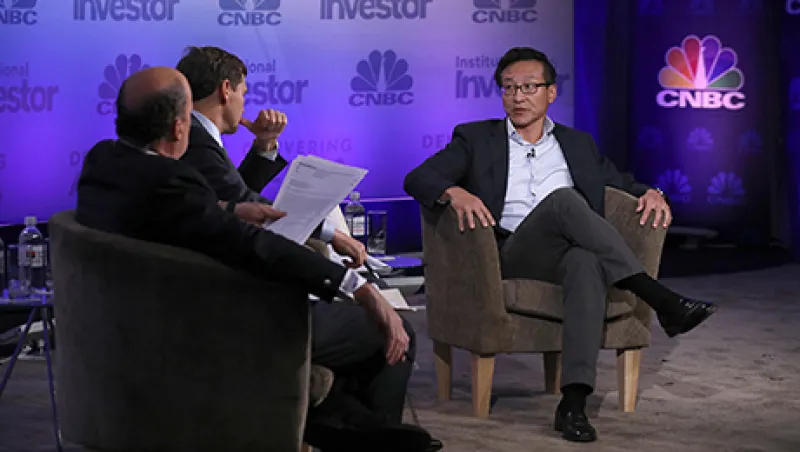Chinese e-commerce giant Alibaba just posted a blowout quarter, growing revenue 59 percent, to $4.8 billion, increasing monthly mobile active users by 39 percent and more than doubling mobile revenue. Its Taobao app now boasts 427 million monthly users, who open the app seven times a day on average.
But short-seller Jim Chanos isn’t impressed. The founder of short-biased hedge fund firm Kynikos Associates said on Tuesday from the stage at the Pierre hotel at the Delivering Alpha conference that Alibaba is growing its balance sheet much faster than it’s growing revenue and repeated earlier criticisms of Alibaba’s delivery arm.
“It’s the Chinese model; you never see anything,” Chanos said. “You see the cash going out the door, not coming in the door ... that’s concerning. There’s maddeningly not enough disclosure to tell you what’s happening in this vast network.”
Just a couple of hours after he made these remarks, Joseph Tsai, Alibaba’s vice chairman, took to the stage to defend his company, saying that while he respects Chanos as a short-seller, Alibaba’s stock has appreciated more than 50 percent since Chanos began talking about it.
“The problem is he doesn’t seem to try to understand the business and the power of the digital economy in China. I’d like to invite Jim Chanos to see our campus, see our business, so we can explain our business to him.”
When asked why, given that Amazon.com has full control over its distribution, Alibaba doesn’t also consolidate its distribution business, Tsai explained that to do so would mean the company would have to manage a distribution force of some 2 million people.
“Our platforms generate 40 million packages a day. Amazon handles 5 to 6 million packages a day,” Tsai said. “When you look at 2 million people, managing the warehouses and delivering packages on the streets — if you combine entire work force of FedEx and UPS, that’s 500,000, 600,000 people.”
Alibaba went public on September 19, 2014, listing on the New York Stock Exchange in what turned out to be the biggest IPO in history. It fell sharply during the Chinese stock market rout of last summer, but it’s since bounced back, and then some. The stock is up 61 percent over the past year, gaining 27 percent in the last three months alone.
Chanos clearly hasn’t made money shorting Alibaba. But hedge fund managers haven’t made any money going long on the stock either. That’s because few of them actually own it. At the end of the third quarter of 2014, the same quarter Alibaba went public, at least 106 hedge funds held a position in the stock. As of the end of the second quarter of 2016, just 15 hedge funds counted Alibaba among their top ten U.S. equity positions. Many of those 15 funds are either small firms or manage small U.S. equity portfolios. So much for delivering alpha.
Visit our Delivering Alpha channel for the latest on the conference. Follow #deliveringalpha on Twitter for real time updates, and follow Amanda Cantrell at @amandakcantrell.






